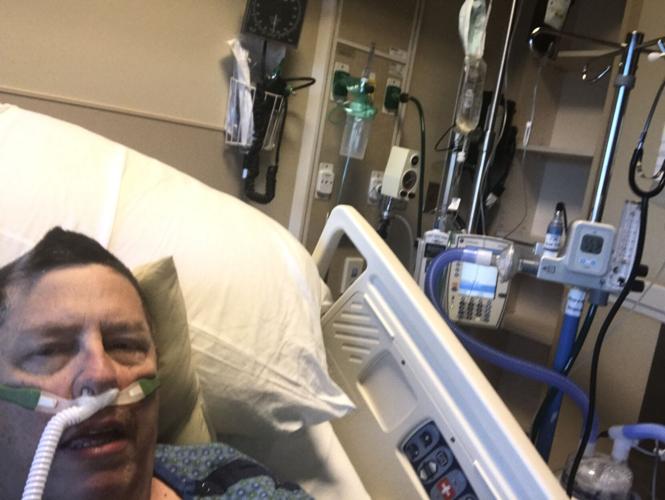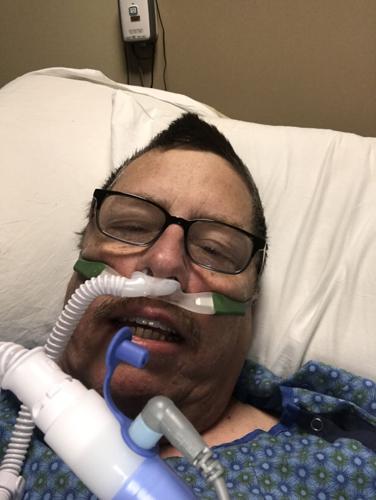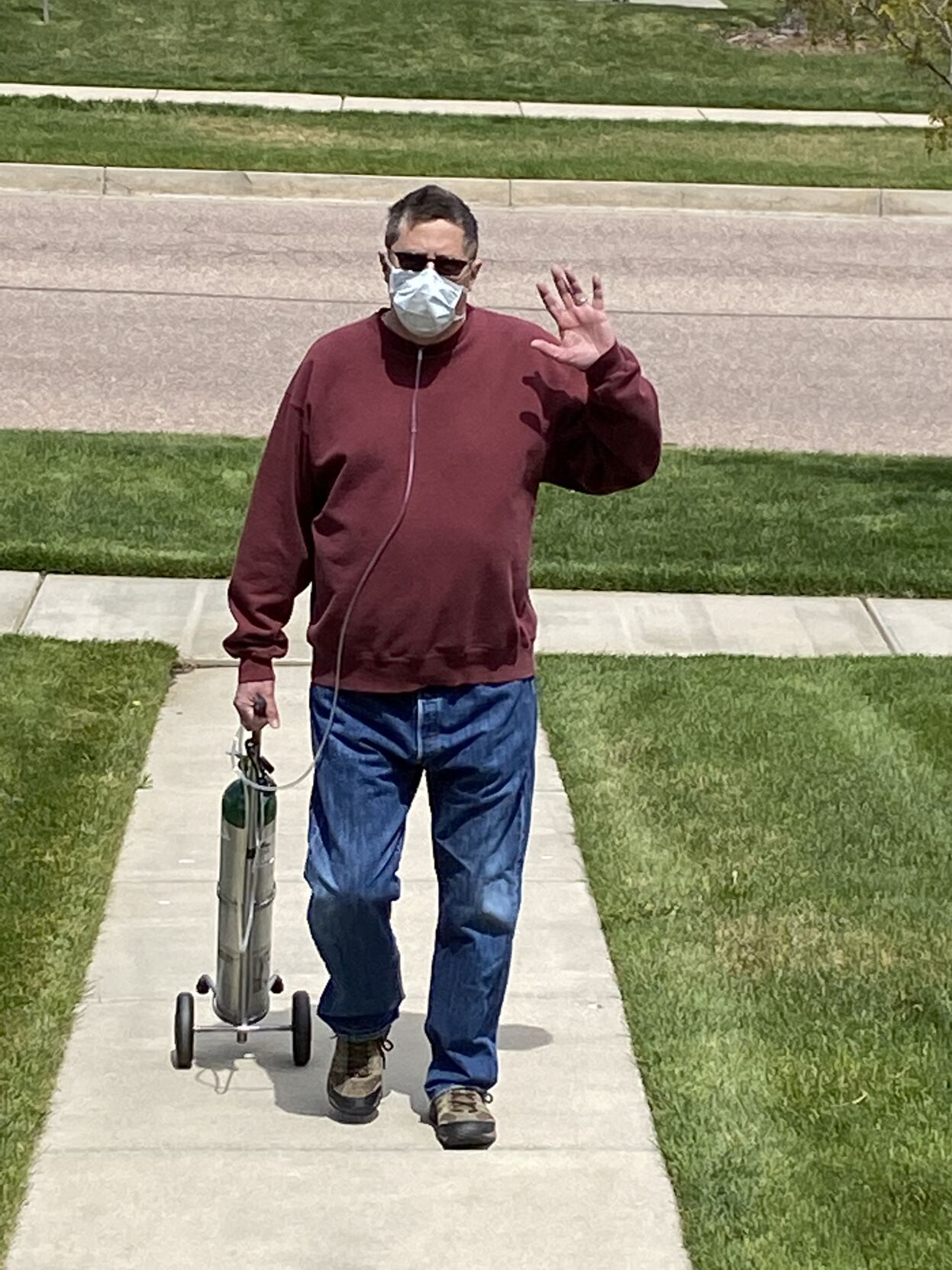For ‘long haulers,’ coronavirus is long-term struggle
Maggie Glass has kept a video diary of her long haul experience. This is an excerpt from July. She is still incapacitated.
{
“@context”: “https://schema.org”,
“@type”: “VideoObject”,
“name”: “NEWS | Video diary from Maggie Glass”,
“description”: “Maggie Glass has kept a video diary of her long haul experience. This is an excerpt from July. She is still incapacitated.”,
“thumbnailUrl”: “https://bloximages.newyork1.vip.townnews.com/denvergazette.com/content/tncms/assets/v3/editorial/2/9d/29dfa79a-88bd-51cb-8707-2c5795a325df/5faae3f6dccea.image.jpg?resize=1396%2C785”,
“uploadDate”: “2020-11-10T11:50:00-07:00”,
“contentUrl”: “https://cdn.field59.com/GAZETTE/9a79de7c9d407ddc694c46c41c183776f5337c9c_fl9-360p.mp4”
}
Maggie Glass laughs at the irony of the name she chose for her once-successful events company. It’s called “Aren’t We Lucky Consulting.”
In reality, 2020 has brought her anything but good fortune. She’s been bedridden since mid-March with lingering symptoms from the novel coronavirus.
“I’ve lost my career; I’ve lost my health; I’ve lost a lot of self-confidence. I look older than I am; I’ve lost my savings; we’ve moved,” said the 43-year-old mother of three, who has had COVID-19 symptoms for eight months. “It’s been horrible.”
Glass of Highlands Ranch is a “long hauler,” the term used to describe people who have been infected with the novel coronavirus and cannot shake the symptoms. Doctors have a medical term for it: “Post-Viral Syndrome,” and are convinced that the pandemic will lead to a surge of people struggling with ongoing illnesses and disabilities.
“The disease affects a wide range of tissues of the body, from the heart, to the lungs, the GI system and the brain,” said Dr. Robert Lam, an emergency physician at UCHealth based in Colorado Springs.
Glass, who spoke to The Denver Gazette by phone from her bed, says doctors have told her that the virus attacked her brain. Recent MRIs show brain lesions that cause migraines and low-grade fevers. She describes a constant brain fog: “I feel dumb. Stupid and lame.”
“There are all of these people who didn’t die who are not fine!” she said. “Seven months long and I’m still not OK! Wear a mask — how hard can this be? You don’t want this!”
Other symptoms seen by medical professionals range from headaches, sore throat, dry cough, chest and back pain, constant high temperature (98.8-100), elevated heart rate and extreme fatigue. According to a patient-led research site, where COVID long haulers report what’s going on with their illnesses, there are dozens of complaints including extreme thirst, sweats, weight gain or loss, joint pain, forgetfulness, nausea, pinkeye, chills and hallucinations.
Recent studies in the United States, Great Britain, France and Italy indicate that the virus lingers in as many as 10% of patients.
Researchers and clinicians at the University of Leicester in the United Kingdom are so alarmed by the black hole that COVID-19 presents they have launched a comprehensive study into “Long Covid,” as they call it. The Post-hospitalization COVID-19 study will track 10,000 patients for a year to get a handle on the virus’ long-term affects. Meanwhile, British politicians have just approved a monthlong lockdown going into winter due to increasing outbreaks.
For disease doubters, Dr. Anthony Fauci gave credibility to long haulers during a July 9 webinar.
“Anecdotally,” he told the conference of viral experts, “There’s no question that there are a considerable number of individuals who have a post-viral syndrome that really, in many respects, can incapacitate them for weeks and weeks following so-called recovery and clearing of the virus,” he said.
A COLORADO STUDY
Lam started seeing lingering symptoms in his COVID patients as early as March.
“We started realizing that there was really something to these patients who weren’t recovering,” Lam said. “The first wave of long haulers were older patients who had more secure finances, but this summer we saw a younger subset. These were healthier patients who were in the active workforce so they had more financial stress.”
He gathered his students, whom he teaches at the University of Colorado School of Medicine, and called every patient who tested positive through three Colorado Springs hospitals, to learn what it meant to be a person recovering from COVID-19.
One hundred and fifty patients later, Lam still has questions because the virus presents with many disguises. Some long haulers were hospitalized, survived and are still living with the virus. Others with milder symptoms self-isolated at home and got worse later. Most of the long haulers Lam saw at the beginning were over 50 and had chronic illness; but this summer, younger, healthier patients started turning up. Lam says there is no common denominator.
“COVID is so new, we still don’t know the effects,” he said.
He plans to publish his research now that most of his data has been gathered.
One of Lam’s research subjects is Paul Nielsen of Colorado Springs, who had three phone conversations sharing his coronavirus experience for the survey. The once-healthy 61-year-old told researchers that he was likely infected in April and then hospitalized in May with a cough and incredible exhaustion.
“It got to where I couldn’t stand in the shower,” Nielsen told the Denver Gazette. “When we left for the emergency room, I was so weak, it took me an hour and a half to make my way to the car.” Nielsen spent two weeks in UC Memorial Hospital North, where he was so close to going on a ventilator, he wondered if he would survive. He believes convalescent plasma saved his life.
Once home, the only contact he had with his wife and teenage daughter were meals left at the door. After two weeks, he finally emerged 18 pounds lighter with breathing problems, heart inflammation, extremely low blood pressure and memory loss. He remembers, “I went to the kitchen and reached for the wrong drawer. I struggled with family names.”
Today, six months after his first symptoms, Nielsen is considered a long hauler, and has developed diabetes. Still, he is back at work as an independent contractor doing database design, and he exercises regularly to help claw his way back to being himself.
“It’s concerning,” he said, ‘But I was a widower, so I know how precious life is. I wake up everyday and say ‘Woohooo! I’m alive!’ ”
INSURANCE WOES
Nielsen said that because of the onset of diabetes from the virus, private insurance companies will not cover him, so he is looking into coverage through the Affordable Care Act.
Maggie Glass is covered by her husband’s insurance.
Both Glass and Nielsen hope Colorado lawmakers don’t forget them at the upcoming legislative session. “I think there should be financial help. Some sort of post-COVID education, but also therapy,” Glass said. “I don’t think our doctors know what’s going on; there’s no education for them. My doctor literally says on the phone, ‘I have to research that.’ I send her articles.”
Kyle Mullica, D-Northglenn, admits it’s early to be considering legislation specifically for long haulers. He told The Denver Gazette that he will fight for stimulus plans to help coronavirus patients who have lost their jobs and can’t work, or who may have lost insurance.
“I’m committed and my caucus is committed to making sure pre-existing conditions continue to be covered,” he said. “I don’t think anyone should go bankrupt or lose their house because they got sick.”
Mullica, who is an ER nurse, says he’s seen a recent spike in cases. “I’ve been seeing firsthand the effects that COVID has on the respiratory system. It’s not a joke.”
SYMPTOMS “FELT MADE UP”
Despite the nod by medical professionals like Mullica, Lam, Fauci and others in the medical profession, long haulers are often questioned about whether they’re faking their illness. Glass says she was losing her mind early on because she couldn’t bounce back to her normal healthy self.
“It felt made up,” she said. “How have I had a fever this long and what are all of these headaches? I was starting to worry that this was going to kill me. Doctors weren’t believing me.”
Glass says a closed international Facebook group pulled her out of a deep depression. “The group was a miracle,” she told The Denver Gazette. “Here was this group of hundreds of people with the same symptoms as me saying the same thing: ‘No one knows what’s wrong with me.’ ”
For Nielsen, a nearly 7,000-member Facebook group called “COVID-19 Survivor Corps” is a place for explanations and shared stories. “Attitude makes a big difference. I get on and answer people’s questions.”
Nielsen is writing a book about his experience called “COVID Case 741,” named because he was El Paso County’s 741st case.
He says many of the questions he was asked during UCHealth’s surveys involved mental health. It’s a subject Lam can’t ignore.
“We discovered that when patients were released, they were experiencing high levels of isolation and depression,” he says. “This is such a new disease that no one has the playbook here. No one knows how patients will recover.”








